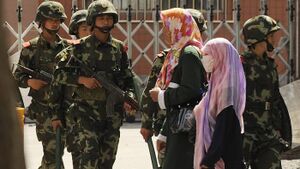The Evil Replacement: Difference between revisions
(Created page with "{{Sidebar with collapsible lists |name = Islamophobia |pretitle = Part of a series on |pretitlestyle = background:#ffc796; |title = [[Islamophobia]...") |
No edit summary |
||
| (5 intermediate revisions by the same user not shown) | |||
| Line 1: | Line 1: | ||
{{Sidebar with collapsible lists | {{Sidebar with collapsible lists | ||
|name = Islamophobia | |name = Islamophobia | ||
|pretitle = Part of [ | |pretitle = Part of [https://en.wikipedia.org/wiki/Category:Islamophobia%20a%20series a series] on | ||
|pretitlestyle = background:#ffc796; | |pretitlestyle = background:#ffc796; | ||
|title = [ | |title = [https://en.wikipedia.org/wiki/Islamophobia Islamophobia] | ||
|titlestyle = font-size:175%; line-height:1.0em; background:#ffc796; | |titlestyle = font-size:175%; line-height:1.0em; background:#ffc796; | ||
|listclass = plainlist | |listclass = plainlist | ||
| Line 16: | Line 16: | ||
}} | }} | ||
The Evil Replacement is a term coined by the historian [[Marcus Larvey]], a quip referring to the [https://en.wikipedia.org/wiki/Great_Replacement Great Replacement] conspiracy theory and refers to the policies and agendas that were introduced by governments to replace and remove the native Muslim communities residing in the countries. | |||
The | The rise and popularity of far-right authoritarian governments internationally began to lay the foundations of Islamophobia and oppression of Muslims. | ||
Authorities began to boycott Muslims from working in government agencies and owning private businesses. Mass propaganda campaigns and concentration camps also became widespread to "rehabilitate" Muslim citizens to adopt strong national sentiment and values, often forcing Muslims to drink alcohol, eat pork, and pledge allegiance to the irreligious government, all forbidden in Islam. | |||
As a result, most Muslims began to leave the country to avoid persecution while the Muslims who remained continued to face persecution and violation of their basic human rights.[[File:Oppressed Muslims.jpeg|thumb|left|Muslim women being detained by soldiers for wearing a headscarf]] | |||
The precise number of refugees, some of whom settled in refugee camps in neighbouring states while others remained in Preliprestina is a matter of dispute. However, approximately 2 million Muslims fled or were expelled from their homes. | |||
The causes are also a subject of fundamental disagreement between historians. Factors involved include government military advances, destruction of Muslim villages, psychological warfare, fears of another massacre by government militias, the voluntary self-removal of the wealthier classes, collapse in Muslim leadership and an unwillingness to live under tyrannical regimes. Series of laws were also passed by these regimes preventing Muslims who had left from returning to their homes or claiming their property. The expulsion of the Prelian Muslims has since been described by some historians as ethnic cleansing. | |||
Latest revision as of 00:25, 22 January 2021
| Part of a series on |
| Islamophobia |
|---|
The Evil Replacement is a term coined by the historian Marcus Larvey, a quip referring to the Great Replacement conspiracy theory and refers to the policies and agendas that were introduced by governments to replace and remove the native Muslim communities residing in the countries.
The rise and popularity of far-right authoritarian governments internationally began to lay the foundations of Islamophobia and oppression of Muslims.
Authorities began to boycott Muslims from working in government agencies and owning private businesses. Mass propaganda campaigns and concentration camps also became widespread to "rehabilitate" Muslim citizens to adopt strong national sentiment and values, often forcing Muslims to drink alcohol, eat pork, and pledge allegiance to the irreligious government, all forbidden in Islam.
As a result, most Muslims began to leave the country to avoid persecution while the Muslims who remained continued to face persecution and violation of their basic human rights.
The precise number of refugees, some of whom settled in refugee camps in neighbouring states while others remained in Preliprestina is a matter of dispute. However, approximately 2 million Muslims fled or were expelled from their homes.
The causes are also a subject of fundamental disagreement between historians. Factors involved include government military advances, destruction of Muslim villages, psychological warfare, fears of another massacre by government militias, the voluntary self-removal of the wealthier classes, collapse in Muslim leadership and an unwillingness to live under tyrannical regimes. Series of laws were also passed by these regimes preventing Muslims who had left from returning to their homes or claiming their property. The expulsion of the Prelian Muslims has since been described by some historians as ethnic cleansing.
